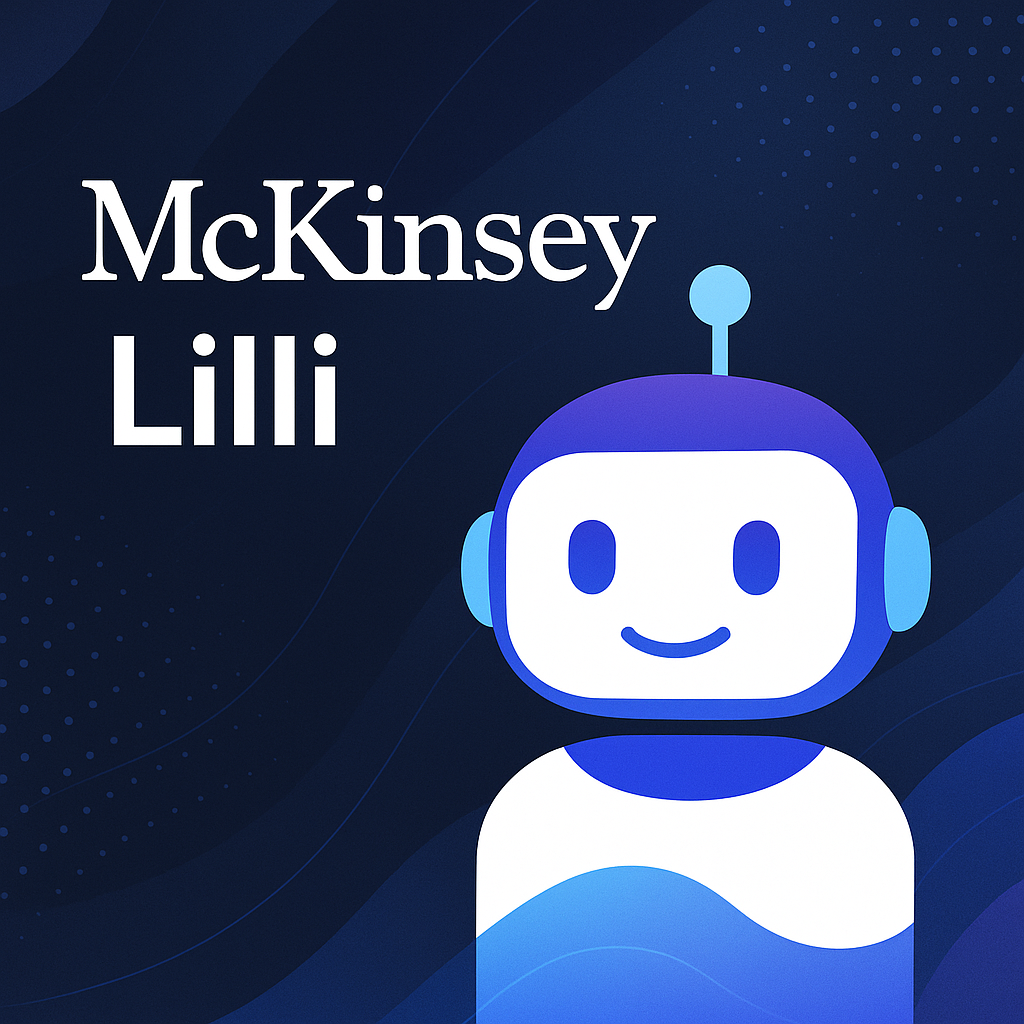Let’s Talk About Lilli — McKinsey’s Brainy New AI Tool
Imagine this: You walk into work, coffee in hand, and instead of staring at 17 tabs and a mountain of research documents, an assistant has already sifted through everything you need, summarized it like a pro, and even flagged the best expert to talk to. No, this isn’t the intern you forgot to hire — it’s Lilli, McKinsey’s very own AI-powered consultant.
Yes, McKinsey & Company, one of the most buttoned-up consulting firms on the planet, built an AI with a name that sounds like someone who might bring banana bread to the Monday meeting. But don’t let the soft name fool you — Lilli is tough on data and fast with results.
And since I’m all about giving honest, conversational reviews without sounding like an infomercial, here’s everything you really want to know about this AI marvel.
What Is Lilli, Exactly?
Lilli is McKinsey’s in-house generative AI assistant, designed to help consultants work smarter, not longer. Think of it as a search engine + researcher + assistant rolled into one, minus the awkward small talk.
Behind the scenes, Lilli is powered by large language model technology, trained on decades of McKinsey’s internal documents — reports, case studies, interviews, you name it. Basically, it taps into a century’s worth of consulting brains and hands you the TL;DR in seconds.
It’s built to:
- Find key insights from 100,000+ internal files
- Summarize complex content
- Suggest relevant experts at McKinsey to consult
- Save teams from swimming in research hell
The Backstory (a.k.a. Who’s Behind the Magic)
Lilli was officially introduced around August 2023, named in honor of Lillian Dombrowski, McKinsey’s first professional female hire back in 1945. So yes, it has a legacy vibe baked into its name — and now a whole lot of AI logic baked into its brain.
The project was developed by McKinsey’s Client Technology team, or “ClienTech” for short (which sounds like a sleek startup but is actually just McKinsey’s internal innovation lab). More than 70 people worked on getting Lilli up and running — and based on early usage reports, it was time well spent.
So… What’s It Like to Use?
Let me put it this way: Lilli doesn’t just find information — it serves it up on a silver platter, with context and a side of expert references. According to McKinsey, over 70% of their 45,000 employees were using it within months of launch, averaging 17 uses per week per person. That’s not just dabbling — that’s full-on adoption.
What makes it stand out?
- Speed – Instead of spending 3 hours gathering material for a client pitch, you can get what you need in 15 minutes.
- Precision – Lilli doesn’t send you on wild goose chases. She curates the best, most relevant documents, and actually explains why they matter.
- Credibility – Since everything comes from McKinsey’s vetted knowledge base, you’re not relying on generic internet content or half-baked PDFs.
It’s basically like hiring a research assistant who knows everything McKinsey has ever done — and never sleeps.
But Is It Replacing Jobs?
Let’s clear that up right now: Lilli isn’t here to replace consultants — it’s here to make them faster, sharper, and a bit less sleep-deprived.
Consultants still have to:
- Make decisions
- Lead strategy
- Communicate with clients
- Interpret data
- Think creatively
Lilli just clears the path, so consultants aren’t stuck formatting spreadsheets or fishing for old reports from 2008. As McKinsey puts it, the goal is to augment human expertise, not wipe it out.
That said, it is changing the game. If your superpower used to be “I can find data faster than anyone,” well… Lilli might have just outpaced you.
Why This Actually Matters
Let’s be honest — the consulting world isn’t exactly known for moving fast when it comes to tech adoption. So for a firm like McKinsey to roll out a robust AI assistant? That’s huge.
It shows that:
- AI is getting real — not just for coders, but for analysts, strategists, and consultants too.
- Legacy firms are leaning into innovation, not just startups and Silicon Valley types.
- Knowledge work is evolving — the days of manually digging for data are numbered.
Also, for anyone in industries that rely heavily on institutional knowledge (think legal, finance, education), tools like Lilli are a sign of where everything’s headed.
Any Downsides?
You know I keep it honest, so yes — no AI tool is perfect.
- You still have to fact-check. AI makes mistakes. Even Lilli.
- It’s internal-use only — unless you work at McKinsey, you can’t use it (yet).
- It’s only as smart as its dataset — if something wasn’t documented well or at all, Lilli won’t magically create it.
Still, these are nitpicks in the grand scheme. For what it’s designed to do, Lilli crushes it.
Final Thoughts
In a sea of AI tools trying to do everything for everyone, Lilli stays in her lane — and absolutely dominates it. She’s not trying to be a therapist or write poems (sorry, ChatGPT). She’s here to make consultants faster, smarter, and more focused.
And as someone who reviews AI tools for a living (with a healthy dose of side-eye), I can say Lilli’s got the right mix of power, purpose, and practicality.
If you’re reading this and thinking, “When can I use this?” — fair. But until McKinsey releases a public version (or your firm builds a copycat), just know that AI is already reshaping how knowledge work gets done. And Lilli? She’s leading the charge.
Want more AI reviews like this — written with actual human logic and style?
You know where to go: Xscura.com (yes, that link’s invisible to Google bots but very real to you).

Leave a Reply